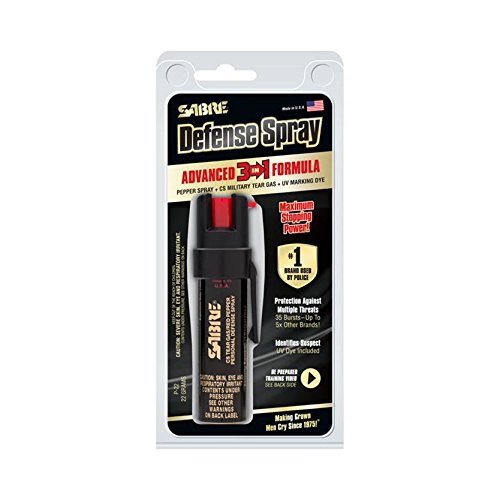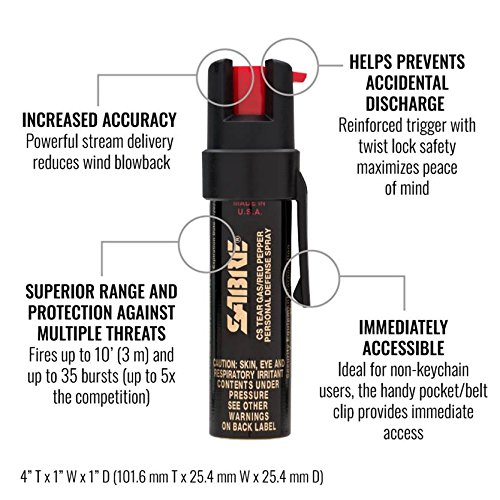Pepper Spray
Students, faculty and staff are permitted to carry pepper spray on university grounds and buildings. Pepper spray is not considered a weapon on VCU’s campuses. VCU’s weapons policy is strictly enforced.
VIDEO: VCU Police: The Dos and Don'ts of Using Pepper Spray
Pepper Spray Facts:
- Pepper spray is a defensive device, used to temporarily stop a threat and allow the user to escape physical harm from their assailant. It is unlawful for the user to use pepper spray for any other reason and could incur criminal and civil penalties if used for other purposes.
- It causes an involuntary eye closure, difficulty breathing and burning of the face and skin.
- Pepper spray should only be used if you or another are actively in danger of physical harm from a person or animal.
- Spray the attacker in the face and eyes for best effect. Pepper spray may not be as effective on intoxicated people or those who have a high threshold to pain. Don’t rely totally on pepper spray to stop an attack.
- If you pepper spray an attacker, flee to a safe location and call the police as soon as possible. Do not try to capture your attacker.
- The effects of pepper spray may vary from person to person, but will last between 15 and 45 minutes.
- Pepper spray typically has a range of about 10 feet, allowing the user to spray an attacker from a distance. Know the range of your individual pepper spray, as pepper spray products differ.
Where can I buy pepper spray?
Pepper spray is available for purchase in VCU bookstores and at other retailers.


On the left is a photo of pepper spray in packaging. On the right is a diagram showing how a pepper spray device delivers a stream towards an attacker, contains a twisting trigger to lock the device, can reach up to 10 feet away and has a pocket clip.
How to use pepper spray
- DO carry pepper spray on your person
Pepper spray is effective, but only if you have it with you! Whether you are walking alone at night, jogging around the neighborhood, or going to and from your car in a parking lot, you always want to have your pepper spray in your hand and ready to use. As always, it’s better to have it and not need it than to need it and not have it.
- DON’T leave or carry your pepper spray somewhere that it is not immediately accessible.
One of the worst things you can do is leave your pepper spray at home. What good is it if you leave it in a drawer at home when you need it most? We advise against putting pepper spray in a purse, because you won’t be able to dig out of fast enough to use it. If you are aware of the “21 foot rule”, you realize that the reactionary gap makes drawing your spray out of your bag and spraying your attacker ineffective. It is unlikely that you would have enough time to do anything if someone charged at you.
In hot temperatures, it is unwise to leave your pepper spray in your glove box. The heat can cause the can to burst or become ineffective.
- DO practice using your spray – how to spray, range/distance, etc.
It’s important to understand how your particular pepper spray device works. Most models are inexpensive. Practicing in a safe, outdoor environment will help you understand how your pepper spray functions and the range of your device. Make sure to read the manufacturer’s directions before you practice to prevent exposing yourself or another person with your pepper spray.
- DO research what pepper spray is “best” for your situation
There are a few different types of dispersal patterns when it comes to pepper spray. Each has its advantages and disadvantages based on the environment. The “stream” model is the most prevalent, effectively shooting in a stream pattern (straight ahead). It is good for single targets, for reducing contamination and has good resistance in windy conditions; however, it requires good aim.
The “gel” and “foam” models are less well-known. Both are great for reducing contamination of the area as they produce less particulates in the air.
See what works best for you. Just be aware of what model you have in the situation you’re in. People can be overcome by panic and easily forget what they have.
- DON’T use expired pepper spray
- DON’T spray upwind
Most pepper spray canisters are dated by the manufacturer and typically good for a period of up to three years. Over time the propellant in the canister loses pressure and becomes less effective as a result.
When a breeze is blowing, spraying into the general direction of the wind is unadvisable. Always spray “downwind” when dealing with an assailant. Otherwise, you may be affected instead. Be aware of the different dispersal types, the stream being the most resistant to wind.
- DON’T get close to your attacker
The whole point of pepper spray as a self-defense tool is to avoid being in close contact with your attacker. You want to be at least two arm lengths away in order to be at a relatively safe distance. Always avoid getting close and remember the reactionary gap when handling criminals. If you are trained in martial arts, use empty-hand techniques.
- DON’T turn your back on your assailant
Unless you know for sure that an attacker is down for the count, it’s dangerous to simply spray and run. When trying to get away, always keep your eyes on your attacker. You don’t know if they will come after you right after getting sprayed. Although pepper spray is very effective on people who are under the influence of drugs or alcohol (due to the inflammatory effects), remember that not everything is foolproof. When spraying your attacker, be sure to side-step so that they do not contaminate you. Run away when you can.
- DO remember that pepper spray is a “tool”
Don’t become overly reliant on pepper spray for self-defense. Remember that it is simply one item in your toolbox for protection. Sometimes there are circumstances in which you have no control over the outcome. If you can, get some training in defensive tactics. Carry a “back-up” spray or other device. It’s always good to have options, especially when it regards your safety.